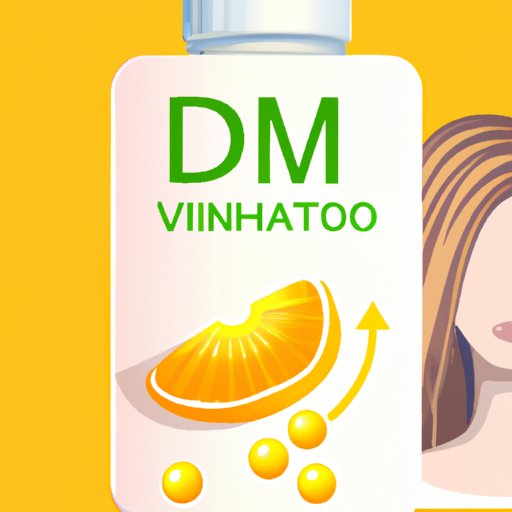
Does Vitamin D Help with Hair Growth?
Hair loss and slow hair growth can be a frustrating problem for many people. While there are several potential causes, including genetics, stress, and nutritional deficiencies, some experts suggest that increasing your intake of vitamin D may be an effective way to support healthy hair growth. In this article, we’ll explore the science behind the relationship between vitamin D and hair growth, what experts are saying about the potential benefits, and practical tips for adding more of this important nutrient to your diet and lifestyle.
The Science behind Vitamin D and Hair Growth: How the Nutrient Affects Your Strands
Vitamin D is a fat-soluble vitamin that is essential for a healthy body. It helps with the absorption of calcium, regulates immune function, and supports healthy bones and teeth. Vitamin D also plays a critical role in hair growth and health. Research suggests that vitamin D receptors are present in hair follicles, and that the nutrient can influence the hair growth cycle.
One study published in the Journal of Clinical Endocrinology and Metabolism found that women with hair loss had significantly lower levels of vitamin D than the control group. Other studies have shown that vitamin D deficiency can lead to hair loss, and that supplementation may improve hair growth in people with deficiencies.
Can Vitamin D Really Help with Hair Growth? Here’s What Experts Say
While there is some evidence to suggest that vitamin D can promote healthy hair growth, experts caution that more research is needed to fully understand the relationship between the nutrient and hair health. Some studies have conflicting results, and it is important to consider other factors such as age, gender, and overall health.
That being said, many experts agree that vitamin D is an important nutrient for overall health, and that it may have potential benefits for hair growth as well. The National Institutes of Health recommends that adults get between 600 and 800 IU of vitamin D per day.
Boost Your Hair Growth with Vitamin D: Simple Ways to Add the Nutrient to Your Routine
So how can you incorporate more vitamin D into your diet and lifestyle? Here are a few tips:
Eat vitamin D-rich foods: Some natural food sources of vitamin D include fatty fish (such as salmon, tuna, and mackerel), egg yolks, and fortified dairy products. Make sure to choose wild-caught fish and organic dairy when possible.
Get some sunshine: Vitamin D is often called the “sunshine vitamin” because your skin produces it when exposed to sunlight. Spend some time outdoors (with sunscreen, of course) to soak up some natural vitamin D.
Consider supplements: If you have a deficiency or have trouble getting enough vitamin D from food and sunlight, you may want to consider taking a supplement. Talk to your healthcare provider before starting any new supplement regimen.
The Connection between Vitamin D Deficiency and Hair Loss: What You Need to Know
In addition to potential benefits for hair growth, vitamin D deficiency can have negative effects on your overall health. Symptoms of deficiency may include bone pain, muscle weakness, and fatigue. In severe cases, deficiency can lead to a condition called rickets, which causes soft and weak bones.
Research also suggests that vitamin D deficiency may be a contributing factor in hair loss. If you are experiencing unusual hair loss, it may be worth getting your vitamin D levels checked. Your healthcare provider can perform a simple blood test to check your vitamin D status.
If you are diagnosed with a deficiency, there are several steps you can take to address the issue. First and foremost, work with your healthcare provider to determine the best course of action. In addition, make sure to get more vitamin D-rich foods into your diet, spend more time in the sun, and consider adding a supplement.
Nourishing Your Hair from Within: How Vitamin D Can Promote Stronger, Healthier Strands
While vitamin D is often touted as a potential solution for hair loss, it is important to remember that overall hair health is about more than just growth. We can’t always control factors like genetics and age, but we can take steps to promote stronger, healthier hair from the inside out.
In addition to getting enough vitamin D, your hair (and body) will benefit from a healthy diet full of nutritious foods. Choose whole, unprocessed foods whenever possible, with an emphasis on fruits, vegetables, lean protein, and healthy fats.
Regular exercise and stress management strategies can also help support overall health and well-being, which can positively impact your hair.
Conclusion
Vitamin D may offer some potential benefits for hair growth and overall health, but it is important to approach the topic with moderation and mindfulness. While it can be tempting to look for a quick fix for hair loss or slow growth, true hair health requires a multifaceted approach that addresses underlying issues and nourishes the body from the inside out.
If you are interested in using vitamin D to support healthy hair growth, talk to your healthcare provider and consider incorporating more vitamin D-rich foods into your diet, getting more sunshine, and possibly taking a supplement. Above all, remember that healthy hair is a reflection of overall health and well-being.





